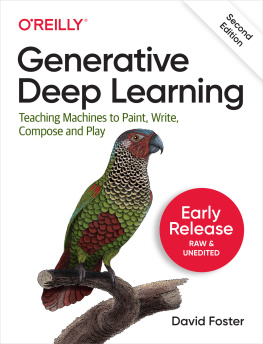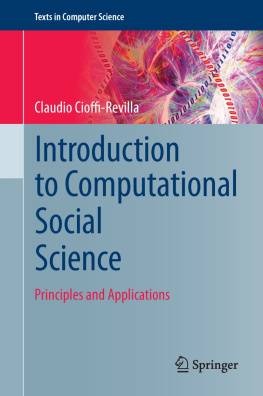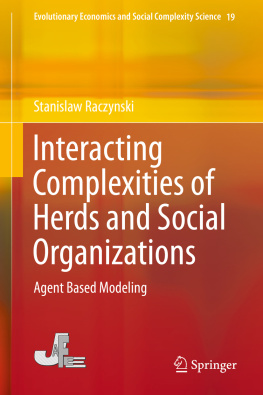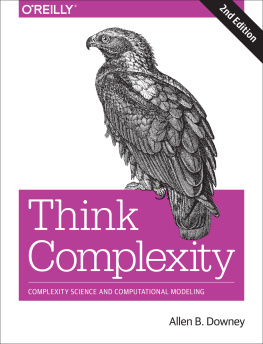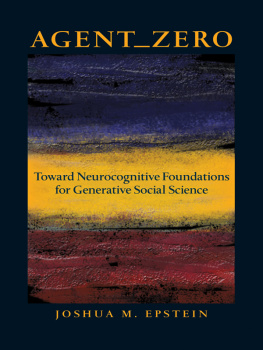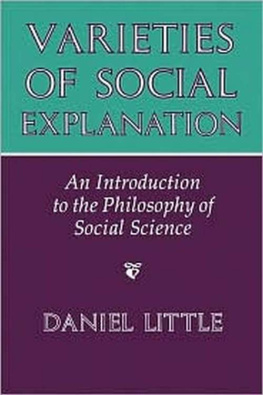Princeton Studies in Complexity
Simon A. Levin (Princeton University)
and Steven H. Strogatz (Cornell University), Editors
Lars-Erik Cederman, Emergent Actors in World Politics:
How States and Nations Develop and Dissolve
Robert Axelrod, The Complexity of Cooperation: Agent-Based Models
of Competition and Collaboration
Peter S. Albin, Barriers and Bounds to Rationality: Essays on Economic
Complexity and Dynamics in Interactive Systems. Edited and with an
introduction by Duncan K. Foley
Duncan J. Watts, Small Worlds: The Dynamics of Networks between
Order and Randomness
Scott Camazine, Jean-Louis Deneubourg, Nigel R. Franks,
James Sneyd, Guy Theraulaz, Eric Bonabeau,
Self-Organization in Biological Systems
Peter Turchin, Historical Dynamics: Why States Rise and Fall
Andreas Wagner, Robustness and Evolvability in Living Systems
Mark Newman, Albert-Laszlo Barabasi, and Duncan Watts, eds.,
The Structure and Dynamics of Networks
J. Stephen Lansing, Perfect Order: Recognizing Complexity in Bali
Joshua M. Epstein, Generative Social Science: Studies in Agent-Based
Computational Modeling
Generative
Social Science
STUDIES IN AGENT-BASED
COMPUTATIONAL MODELING
Joshua M. Epstein
PRINCETON UNIVERSITY PRESS
PRINCETON AND OXFORD
Copyright 2006 by Princeton University Press
Published by Princeton University Press, 41 William Street,
Princeton, New Jersey 08540
In the United Kingdom: Princeton University Press, 3 Market Place, Woodstock,
Oxfordshire OX20 1SY
Requests for permission to reproduce material from
this work should be sent to Permissions,
Princeton University Press.
Library of Congress Cataloging-in-Publication Data
Epstien, Joshua M., 1951
Generative social science: studies in agent-based computational modeling / Joshua M. Epstein
p. cm.(Princeton studies in complexity)
Includes bibliographical references and index.
ISBN-13: 978-0-691-12547-3 (cloth : alk. paper)
ISBN-10: 0-691-12547-3 (cloth : alk. paper)
1. Social sciencesComputer simulation. 2. Social sciencesMathematical models. I. Title. II. Series.
H61.3.E67 2007
300.1'13dc22
2006004238
British Library Cataloging-in-Publication Data is available
This book has been composed in Sabon
Printed on acid-free paper.
pup.princeton.edu
Printed in China
1 3 5 7 9 10 8 6 4 2
For Melissa, Matilda, and Joey
CONTENTS
INTRODUCTION
The introduction to Growing Artificial Societies offers the following thought on the future of explanation:
What constitutes an explanation of an observed social phenomenon? Perhaps one day people will interpret the question, Can you explain it? as asking Can you grow it? Artificial society modeling allows us to grow social structures in silico demonstrating that certain sets of microspecifications are sufficient to generate the macrophenomena of interest.We can, of course, use statistics to test the match between the true, observed, structures and the ones we grow. But the ability to grow themis what is new. Indeed, it holds out the prospect of a new, generative, kind of social science.
A concluding section of the same work, entitled Generative Social Science, restates the point even more broadly:
In effect, we are proposing a generative program for the social sciences and see the artificial society as its principal scientific instrument. (177)
This book presents some of the achievements of that, now quite vibrant, program, and illustrates the scope of (at least my own) agent-based computational research since Growing Artificial Societies. Indeed, one candidate title for the present volume was Growing Artificial Societies II. But that book had its own flavor. While it made a substantial number of concrete claims (some of which will be recalled here), it was more a general call to arms than a concerted attack on any particular problem, more methodological than applied, more a laboratory than any particular experiment.
By contrast, the chapters that follow are much more focused studies in particular areas: the history of the Anasazi; the emergence of economic classes; the timing of retirement; the evolution of norms; the dynamics of ethnic conflict; the spread of epidemics, and organizational adaptation among them. While the chapters span the social sciences from archaeology to economics to epidemiology, there is unity to the volume. Indeed, each subsequent chapter illustrates core points made in the overarching methodological statement of As such, the book is more than a collection; it makes an argument.
The Stakes: Explanation
To me, the core of that argument concerns the notion of a scientific explanation. This is really what is at stake, if you will, in the advent of agent-based models: What is to be the accepted standard of explanation in the social sciences? In this book, I define and argue for a generative standard and highlight a toolthe agent-based computational model, or artificial societythat facilitates the construction of scientific models satisfying that standard. The notion of a generative explanation, which was not defined at any length in Growing Artificial Societies, is discussed at length in the opening chapter below, but is encapsulated nicely in the motto: If you didn't grow it, you didn't explain it. Or, under the obvious interpretation of the symbols:

Dynamic Attainment versus Static Existence of Equilibrium
This represents a sharp departure from prevailing practice. While there are notable dynamic exceptions, game theory and mathematical economics (the twin pillars of contemporary social science) are overwhelmingly concerned with equilibria, Nash equilibrium being the most important example. Indeed, in these quarters, explaining an observed social pattern is basically understood to mean demonstrating that it is the Nash equilibrium (or a distinguished Nash equilibrium) of some game. However, these are mere demonstrations of existence. Per se, they do not demonstrate that the configurations of interestthe patterns allegedly explainedare attainable at all, much less attainable on time scales of interest to humans. Moreover, standard equilibrium models impose very stringent demands on the individual's information and computing (optimizing) power. They often ignore space, assume global (not local) interactions, and involve little if any heterogeneity.
To the generativist, this is unsatisfactory; to explain a pattern, it does not suffice to demonstrate thatunder this ensemble of stricturesif society is placed in that pattern, no (rational) individual would unilaterally depart (which is the Nash equilibrium condition). Rather, one must show how a population of boundedly rational (i.e., cognitively plausible) and heterogeneous agents, interacting locally in some space, could actually arrive at the pattern on time scales of interestbe it a wealth distribution, spatial settlement pattern, or pattern of violence. Hence, to explain macroscopic social patterns, we try to grow them in multiagent models.
Nonequilibrium Systems
The preceding critique applies even when the pattern to be explained is an equilibrium. But what if it isn't? What if the social pattern of interest is itself a nonequilibrium dynamic? What if equilibrium exists, but is not attainable on acceptable time scales, or is unattainable outright? I hope the book demonstrates that the agent-based generative approach can be explanatory even in such caseswhere the equilibrium approach, if I may call it that, is either infeasible or is devoid of explanatory significance.
Next page

